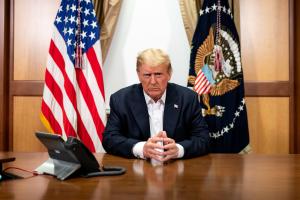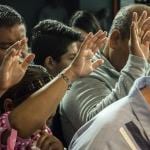
When it was declared that Trump was sick with COVID19, because they have grown not to trust him and what he said, many people doubted it, and many continue to doubt it. But, every indication seems to suggest it is true. He can be seen to have difficulty breathing. Those around him are catching COVID19. It is spreading, and spreading hard and fast, with those in his immediate circle.
It is easy to say, “they deserve it, this is justice.” There is, to be sure, some poetic justice, seeing those who showed little to no concern about COVID19, who showed little to no attempt to protect themselves and others from it, become infected by it. But, we must remember, they are not the only ones who will be hurt from it. Many innocent people who have come in contact with them have been and continue to be put in danger. Is that justice?
No. Justice is not the right word. It is, however, indicative of the problem with COVID19 and why it should be taken seriously. It is also one reason why we should care, and actually be concerned about, those who have been infected by it, including Trump: not only for their own sake, but also for the sake of those they would otherwise put in danger. We should hope and pray for their fast recovery. We should pray for far more than that. We pray they have a change of heart, metanoia. We should pray that their contact with COVID19 gives them a sense of their own mortality, will now take COVID19, and other plights seriously. We should pray that if they come out of the crisis which they now face, they will seek to undo the damage they have done to the United States and the world so as to actually work to make the world a better place.
Obviously, not everyone, when faced with death, will change their ways; many see their temporary victory over death as making them super-human, and so, double-down with what they were doing before they came close to death. They see it as a sign that they are special, instead of taking it as a warning that they, like everyone else, will have to face the consequences of their actions.
Knowing the potential for Trump to take a victory over COVID19 as a sign that he should continue to do as he was doing before he was sick, we still need to hope for his recovery, not because we like him or what he will do if he recovers, but because he is human, made in the image and likeness of God The life he has, like any life, is good. We must not wish death on anyone. We pray for mercy. “For our civil authorities and all our armed forces, let us pray to the Lord.” Lord, have mercy. Kyrie eleison. Hospodi pomiluy.
This call for mercy is a call for the Lord’s mercy. Where the Lord is, there is mercy, but where he is, there is also justice. We hope his mercy realizing that with that mercy, justice will be found. The two go together. Asking for mercy from God indicates we want his help for justice. We put our hope in God that with that mercy, God will find a way to work out justice. We do not have to be pleased with those we pray for; we do not have to accept what they have done or what they stand for. Praying for them, praying for mercy for them, includes praying that they shall experience the pull of justice in their lives. It means we hope that, where necessary, they will change their ways. It is also hope that if they will not, that with that mercy, God will find a way to work out justice through them despite their resistance to it.
Is this not one of the lessons we find in the Lord of the Rings? When Frodo told Gandalf that he wished Bilbo had killed Gollum, Gandalf replied that no one should wish for anyone’s death. Frodo learned what that meant when he met Gollum; like Bilbo, he took pity on Gollum. Frodo even came close to having Gollum change, to redeem him; despite that failure, the mercy of Bilbo and Frodo allowed Gollum to have a major role in destroying the Ring. Gollum did not change his ways; in the end, he betrayed Frodo, but even in that betrayal, the mercy which was shown unto him became a vessel for justice.
When we show pity, when we preserve life, we must trust that some good will come out of it, even if we know the person to whom we show mercy might turn on us and leave us for dead. Praying for mercy, praying that someone should live when they face death, means we put our trust in God, and that he will find a way to work out his justice.
We must pray for all, seeking the salvation of all, including those in high positions:
First of all, then, I urge that supplications, prayers, intercessions, and thanksgivings be made for all men, for kings and all who are in high positions, that we may lead a quiet and peaceable life, godly and respectful in every way. This is good, and it is acceptable in the sight of God our Savior, who desires all men to be saved and to come to the knowledge of the truth (1 Tim. 2:1-4 RSV).
We are called to pray for the salvation of all, we are called to pray for God’s mercy upon all, because even the greatest sinner is made in the image and likeness of God. Everyone has good in them. When we pray for mercy, we pray especially that such good, no matter how hidden it has become due to sin, can be released. So long as there is life, there is hope. We must remain people of hope, and with that hope, have faith and hope for the salvation of all, for we know Jesus worked for the salvation of all:
Faith has untold power to inspire and sustain our respect for others, for believers come to know that God loves every man and woman with infinite love and “thereby confers infinite dignity” upon all humanity. We likewise believe that Christ shed his blood for each of us and that no one is beyond the scope of his universal love. If we go to the ultimate source of that love which is the very life of the triune God, we encounter in the community of the three divine Persons the origin and perfect model of all life in society. Theology continues to be enriched by its reflection on this great truth.[1]
No one is outside of the scope of God’s love. No one should be outside of the scope of our love. This is not to say we cannot and must not resist the evil that people do. We must. Praying for mercy, praying for the restoration of life for those who are sick and close to death does not mean we should ignore the evil they have done, or the evil which they continue to do. We must resist evil, but that resistance must always be done with mercy and love. We resist evil. We seek to put an end to it. We must do so, but we must do so correctly. We must embrace justice ourselves, and follow the dictates of justice. We must not embrace evil to fight evil. We must not become monsters to fight monsters, rather, we must fight monsters with truth and goodness. We must resist them when they are in power, and that includes, finding ways to legitimately take that power away from them. Praying for mercy for those who are in positions of authority includes praying that they will be stopped from doing evil, for being stopped from doing evil will do them good. Thus, Pope Francis says:
Nor does this mean calling for forgiveness when it involves renouncing our own rights, confronting corrupt officials, criminals or those who would debase our dignity. We are called to love everyone, without exception; at the same time, loving an oppressor does not mean allowing him to keep oppressing us, or letting him think that what he does is acceptable. On the contrary, true love for an oppressor means seeking ways to make him cease his oppression; it means stripping him of a power that he does not know how to use, and that diminishes his own humanity and that of others. Forgiveness does not entail allowing oppressors to keep trampling on their own dignity and that of others, or letting criminals continue their wrongdoing. Those who suffer injustice have to defend strenuously their own rights and those of their family, precisely because they must preserve the dignity they have received as a loving gift from God. If a criminal has harmed me or a loved one, no one can forbid me from demanding justice and ensuring that this person – or anyone else – will not harm me, or others, again. This is entirely just; forgiveness does not forbid it but actually demands it. [2]
Praying for Trump, praying for people in authority, does not mean we look for the preservation of their place in authority. It means we hope for the preservation of their life so that they can change their ways. If they will not, our prayer for mercy includes the hope that justice will be had, that oppressors will lose power. It is also a hope of mercy for us. When we pray for those in authority, we pray for mercy, praying, that is, such authority will be used for the common good, or that those who have authority will lose it if they plan to continue to promote injustice with their power.
“Live as free men, yet without using your freedom as a pretext for evil; but live as servants of God. Honor all men. Love the brotherhood. Fear God. Honor the emperor” (1 Ptr. 2:16-17 RSV). Donald Trump is sick. He faces death, if not now, then soon. We must pray for mercy, for him, for us, for everyone. We pray for mercy. We pray for justice. We pray, indeed, for life, for all life, including his. If he survives, let us continue to pray for mercy, a mercy which is just and swift; and if he succumbs to death, let us pray for mercy, for him, for his loved ones, and also for the United States and the world so that, once again, justice can reign supreme. We must not ignore mercy. But we must not neglect justice. The two go together. Seeking mercy must not be used as a pretext for evil, even as praying for those in power must not be seen as excusing us from resisting them when they promote evil.
[1] Pope Francis, Fratelli tutti. Vatican translation. ¶ 85.
[2] Pope Francis, Fratelli tutti, ¶ 241.
Stay in touch! Like A Little Bit of Nothing on Facebook.
If you liked what you read, please consider sharing it with your friends and family!













